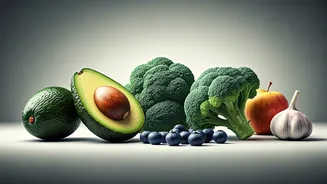Oats: Heart's Best Friend
Oats stand out as a cholesterol-lowering champion, thanks to their soluble fiber content. This fiber absorbs bad cholesterol (LDL) in the digestive system
and helps eliminate it. Including oats in your diet daily can lead to a notable decrease in cholesterol levels. A study indicates that consuming 5-10 grams of soluble fiber daily—equivalent to about ¾ cup of dry oats—can lower both total and LDL cholesterol. Versatile and easy to prepare, oats can be enjoyed as a hearty breakfast, added to smoothies, or used in baking. Start your day with a bowl of oatmeal to kickstart a heart-healthy routine.
Nuts: A Nutritious Choice
Nuts, particularly almonds, walnuts, and cashews, are beneficial for heart health and can lower cholesterol. These nuts are rich in unsaturated fats, fiber, and plant sterols, all of which contribute to lowering LDL cholesterol levels. A research review noted that eating about 2 ounces of nuts daily is associated with a 5% to 15% reduction in LDL cholesterol. Besides lowering cholesterol, nuts offer other health benefits, like providing essential vitamins, minerals, and antioxidants. Add a handful of mixed nuts to your snacks, salads, or main meals, as a simple way to boost your heart health while relishing a satisfying snack.
Beans: Fiber Powerhouse
Beans, including kidney beans, black beans, and lentils, are packed with soluble fiber, making them an excellent choice for lowering cholesterol. The soluble fiber binds with cholesterol in the digestive tract, preventing its absorption. Studies show that people who regularly eat beans experience lower LDL cholesterol levels. Additionally, beans offer protein and are low in fat, making them a nutritious and filling food. Incorporate beans into your meals by adding them to soups, stews, salads, or as a side dish. This simple addition can significantly improve your cholesterol levels and overall health.
Fatty Fish: Omega-3 Benefits
Fatty fish, such as salmon, tuna, and mackerel, are rich in omega-3 fatty acids, which can lower triglycerides and slightly increase good cholesterol (HDL). These omega-3s help reduce the risk of heart disease and support overall cardiovascular health. While they do not directly lower LDL cholesterol, their other benefits contribute to a healthier lipid profile. Aim to eat fatty fish at least twice a week. Prepare them by baking, grilling, or steaming to maintain their healthy fats. This not only enhances your heart health but also provides essential nutrients that support various bodily functions.
Fruits: Healthy Choices
Certain fruits, like apples, grapes, strawberries, and citrus fruits, can play a role in lowering cholesterol. They are sources of pectin, a type of soluble fiber, which helps reduce LDL cholesterol levels. Citrus fruits are particularly rich in vitamin C and antioxidants. Eating these fruits regularly can support heart health and provide a variety of nutrients. Including a portion of these fruits with your breakfast, as a snack, or as a dessert is an easy and delicious way to improve your health. These fruits not only help with cholesterol control but also add vibrant flavors and essential vitamins to your diet.



















